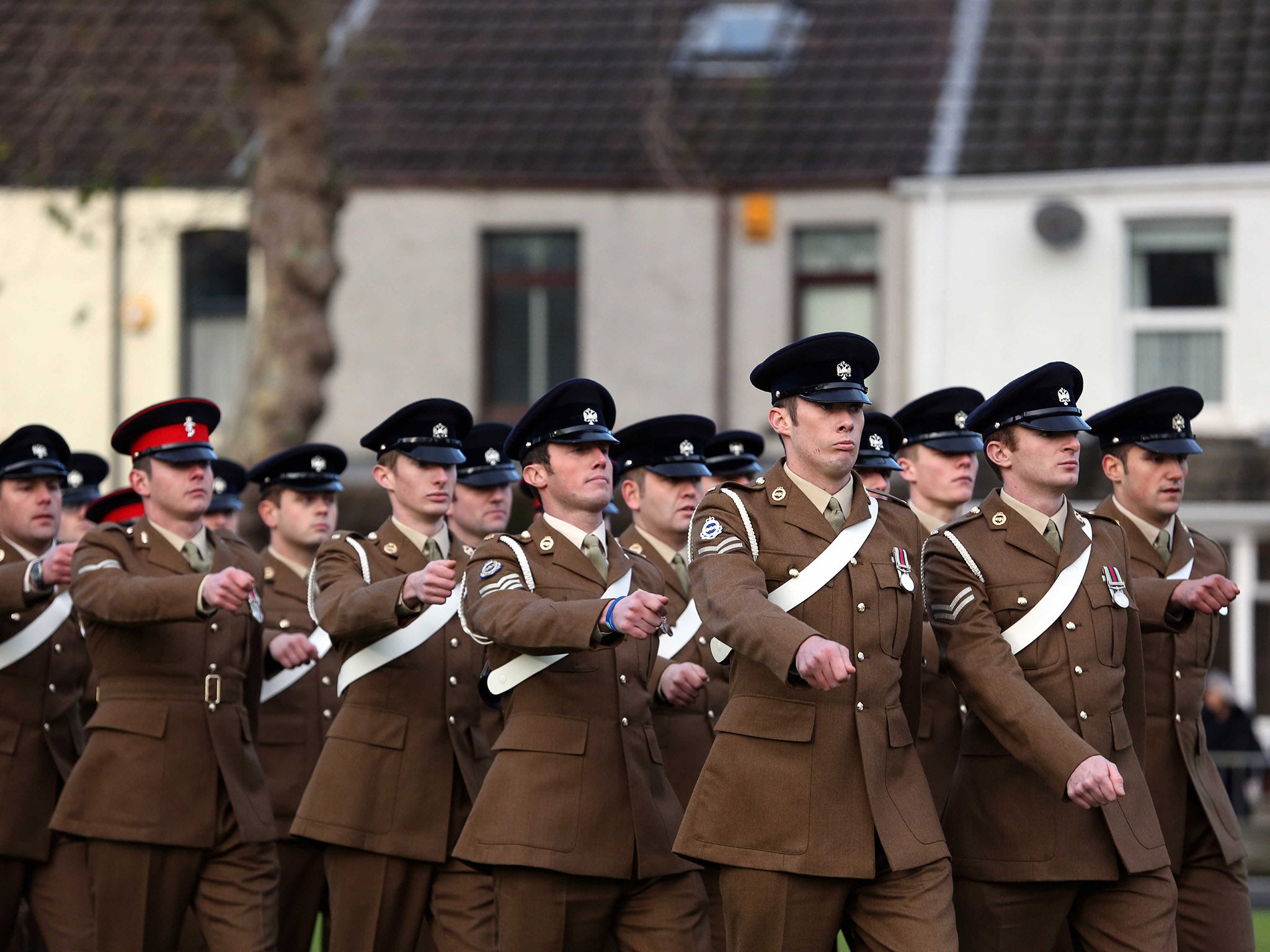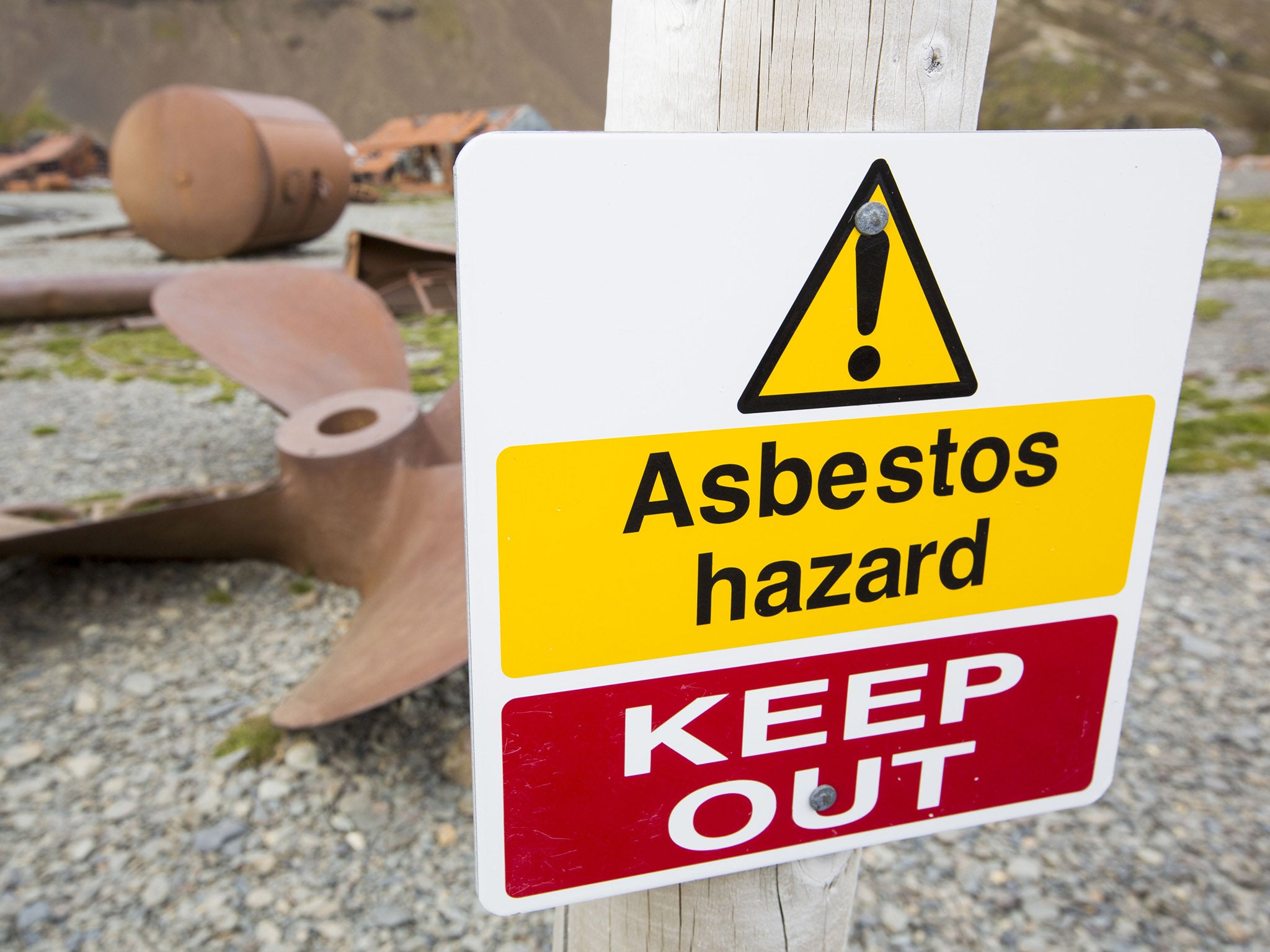Asbestos: Thousands of UK soldiers who develop cancer due to exposure unfairly treated by MoD, say campaigners
Exclusive: While civilians with the fatal disease are entitled to a six figure lump sum, former service personnel get a war pension amounting to a few tens of thousands

Thousands of British veterans who will develop terminal cancer due to being exposed to asbestos during their military service are being unfairly treated by the Ministry of Defence (MoD), campaigners and victims have claimed.
Current laws mean that the MoD does not have to pay compensation for accidents or injuries suffered before 1987, which rules out those with mesothelioma caused by asbestos exposure decades ago. While veterans may be eligible for a war disablement pension, this is a fraction of what civilians are paid in compensation. Unlike their civilian counterparts, veterans are not allowed to take a lump sum.
This means those with mesothelioma, a cancer usually resulting in death within a year or two of diagnosis, get very little compared to those who did not serve. The unequal treatment amounts to a serious breach of the Armed Forces covenant, which is supposed to ensure veterans are not disadvantaged because of their service, according to the Royal British Legion.
Many service personnel were exposed to asbestos when working in the boiler rooms of ships, where the material was routinely used to insulate pipes in the decades after the outbreak of the Second World War. And more than 2,500 Royal Navy veterans will die from mesothelioma in the next three decades, according to researchers at the London School of Hygiene and Tropical Medicine (LSHTM).
While civilians with the fatal disease are entitled to a six figure lump sum under a Government compensation scheme, former service personnel get a war pension amounting to a few tens of thousands - assuming they survive for a year after diagnosis.
The Royal British Legion is calling for the Government to redress the balance and offer veterans the option to receive a lump sum. According to the charity, a 63-year-old old civilian could expect to receive around £180,000 in compensation under the Mesothelioma Act passed last year. Yet one year’s worth of war pension paid at the maximum rate for a non-married naval veteran amounts to just over £31,000.
“The Government’s current compensation arrangements for those veterans suffering with asbestos-related cancer are unfair, and have to change,” said a spokesperson for the charity.

“In the current set-up, some veterans suffering with mesothelioma could receive around £150,000 less in compensation than their civilian counterparts,” they added.
Veterans should be offered compensation “at least equal to how much the courts and the Government have decided that civilians deserve,” said the spokesperson.
Admiral Lord West, former First Sea Lord and Chief of the Naval Staff, commented: “There needs to be a reassessment of what is paid to former service personnel as they are clearly at a disadvantage compared to their civilian counterparts.”
And cross-bench peer Lord Alton said: “It is an injustice that our servicemen and women are discriminated against in this way.”
Organisations such as The Royal Navy and Royal Marines Charity, The Royal Navy and Royal Marines Widows’ Association, and The Royal Naval Association are backing the calls for fairer treatment.
Non-military campaigners also support the demands. Graham Dring, coordinator, Greater Manchester Asbestos Victims Support Group, said: “The MOD were no less culpable than the negligent employers who exposed civilian workers to asbestos and it seems unjust that veterans can only claim a War Disablement Pension and no other compensation for pre-1987 exposure.”
The MoD accepts that military service is to blame in cases where sufferers served in the Royal Navy between 1939 and 1973. Yet there are only 65 veterans currently receiving a war pension due to mesothelioma. There is a “lack of awareness” of the pension scheme and “it may be that sufferers and their families have other priorities, given the inexorable rapid decline in the sufferer’s health,” according to a report on the armed forces compensation scheme by the MoD’s independent medical expert group earlier this year.
Professor Julian Peto, Cancer Research-UK chair of epidemiology at the LSHTM, commented: “Limiting mesothelioma claims to asbestos exposure after 1987 would be absurd and unfair. Mesothelioma almost never develops less than 25 years after asbestos exposure, and the risk is still increasing 60 years later.”
In a statement, a MOD spokesperson said: “The War Pensions Scheme provides a tax-free pension and supplementary allowances, along with dependent’s benefits. We are considering whether any further flexibility can be provided for future mesothelioma claimants under this scheme. The Government places great importance on the health and wellbeing of our veterans and we are clear that they should not be disadvantaged as a result of their service.”
Case study: Fred Minall
Fred Minall spent almost a decade in the Royal Navy, before joining the police where he reached the rank of inspector. Now retired and living in Northampton, the 74-year-old, married with three sons and six grandsons, was recently diagnosed with mesothelioma and has put in a claim to get a war disablement pension. “Between 1957 and 1965 I served as a mechanical engineer. The pipes were covered with asbestos and before we could touch any piece of machinery this insulating material had to be broken away. We would get it all over our overalls and bodies. I’ve been ill since January this year, it wasn’t until August that the doctor diagnosed mesothelioma after an X-Ray, and a CT scan established it had spread into my chest cavity. I’ve discovered that because of when I served I cannot claim compensation from the MoD. I was very very shocked about this and feel it’s unfair, it’s unjust. There must be literally hundreds if not thousands of people in my situation that are simply being pushed aside in terms of compensation. The law ought to be changed because we are being discriminated against, which in this day and age is unacceptable.”
Join our commenting forum
Join thought-provoking conversations, follow other Independent readers and see their replies
Comments